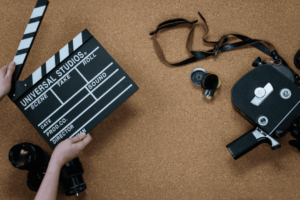If you’re wondering how to get into film school, you’re not alone. Plenty of talented aspiring filmmakers don’t know where to start. Here are some important things to keep in mind when you’re looking into applying to film schools.
Express Yourself Effectively
While great ideas and artistic vision are key, you’ll also need to communicate this in a clear and compelling way. That starts with learning the art of storytelling (from the technical aspects of grammar and language to film language). You don’t need to already be an expert screenwriter — that’s part of the reason you’ll go to film school. Admission representatives want to see that you can write, although they’ll also look at the visual ways you express yourself. If you want some support with the written aspect of your overall application, you can even take a writing class before applying to hone these skills.
Show That You’re Well-Rounded
Good film school applicants have more than raw talent. In many prestigious and competitive programs, academic performance plays a big role in determining the final applicants they select. Don’t breeze through other academic subjects in school because you think you won’t need to use that information later as doing so can bring down your overall application.
Whether you’re applying to film school out of high school or at another stage in your life, there’s plenty about yourself that you can highlight to demonstrate you’re a well-rounded applicant. Previous professional experience, volunteer work, and hobbies beyond film can show that you’re well-rounded.
Embrace Your Authentic Perspective
Film schools are looking for your unique perspective. Tell them your story and what sets you apart from their other applicants. Embrace experiences in your life that can make the stories you plan to tell richer. Whether you travel far or get more involved in the community around you, give yourself the chance to gain perspectives that can come through in your application.
Practice, Practice, Practice
There’s only one surefire way to prove you have talent: by filming. You don’t have to make feature-length movies at this point, but shorter 5- or 10-minute films can help you develop into a stronger cinematographer, director, or writer. That practice will turn you into a better applicant as well, whether or not the program you choose asks for samples of your work.
Take an Acting Class
Even if acting isn’t required to get you into the program you choose, taking an acting class helps you make you into a well-rounded applicant. At the same time, getting experience from the other side of the camera gives you insight into the performer’s experience, including collaboration, taking feedback, and getting into the mindset of a character. Overall, this experience can also help you write interesting characters that actors want to play and direct people in a more empathetic way.
What Do You Need to Apply for Film School?
Making a decision about the film school you want to attend can have big implications for your path as a filmmaker. Some general advice when searching for colleges to apply to includes:
- Consider your passions.
- Don’t go only with “brand names.”
- Understand what film school is really like before applying.
- Think about what type of program would be a good fit for you, considering the size of a program as well as location. After all, you can find great film programs in cities like New York, around the world, and everywhere in between.
- Look into the experience of your potential instructors as well as the facilities a given program offers.
- See how a program will support you in life after film school.
- Check if a program has updated classes, industry equipment, and experienced faculty.
- Look into the non-academic aspects, such as travel opportunities and extracurriculars.
- Speak with current students to see if you fit in.
- Don’t forget to look into scholarships, too!
Some schools may use the Common Application, so you’ll want to build a versatile application if you’re applying to multiple programs.
Common Components of a Film School Application
Some common parts of film school applications include:
- Cinematic arts personal statement
- Writing samples for film school
- Visual sample (you may have an option for video or photo), making sure you specify the role you played in the project
- Creative portfolio list (this is like an artistic resume)
- Letters of recommendation
In your application, you can also mention filmmakers who have created films that inspire you when writing.
Completing the Film School Application
Tips for ensuring you get that application in include:
- Knowing the deadlines for each of the programs to which you’re planning to apply
- Creating a timeline for yourself to make sure you finish each application on time
- If you’re applying while you’re in high school, making sure you add artistic involvements from the fall of your senior year to your portfolio before sending it in
Final Points to Remember When Completing an Application to Film School
- Demonstrate diverse interests in your application.
- Show why you’re a unique candidate.
- It’s usually best to select the video option for a visual sample for film school.
- Don’t write anything inappropriate in the application.
- Remember: Simple stories are often the best.
Types of Film School Programs
You’ll find a few different types of film schools out there. Examples of undergraduate degrees include:
- Bachelor of Arts Degree: This is one of the most accessible ways to study film in college. You typically won’t need a portfolio to be admitted to the school and can major in film studies.
- Bachelor of Science Degree: These programs offer a deeper immersion into the craft and art behind making a film. They often include a film production component.
- Bachelor of Fine Arts Programs: The BFA offers the deepest immersion into filmmaking. It’s a highly structured degree, and programs are often very selective with portfolio-based admissions. You’ll take part in hands-on production and get the biggest exposure to a variety of crafts, such as cinematography, directing, editing, producing, and sound recording, to name only some of the possibilities.
Some great programs to consider, including film schools and summer programs, include:
- USC, University of Southern California’s School of Cinematic Arts
- Santa Fe University of Art and Design
- New York University (NYU-Tisch)
- New York Film Academy
- UCLA
- Florida State University’s Film School
- University of Central Florida’s Film Program
- California State University of California
- Loyola Marymount University
- University of California Los Angeles
- Columbia University
- Syracuse University
- Ithaca Film School
- Savannah School of Art & Design (SCAD)
- Nashville Film Institute
Ways to Prepare for Film School
Any aspiring filmmaker can take a few steps to get prepared for attending film school, even before applying. Some steps you can take include:
- Get real-world experience: Start by making films and videos, even if you’re never taken a film class before. Think: on the weekend, over the summer, with friends. You can even shoot movies on your smartphone to get started.
- Look for feedback from people you trust: Screen those movies for others. Listen to what they say about your work, then use that feedback to hone your skills.
- Develop your skills: Take film classes and/or go to a summer film program. You can also look into high school dual enrollment programs.
- Let yourself explore: Experiment with different aspects of film. Now is the time to see what interests you as well as identify your strengths and weaknesses.
- Enter a competition or festival: If you get in, you’ll have something awesome for your resume. However, the experience of getting that submission ready is an invaluable experience in and of itself.
- Start working on your application: Prepare your artist statement, portfolio, and creative resume. Preparing in advance gives you time to thoughtfully consider and revise before actually sending that application in.
You can learn more about film and how you can improve your skills by applying to the Nashville Film Institute here.














